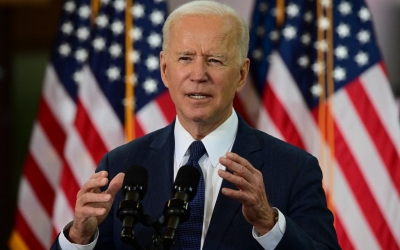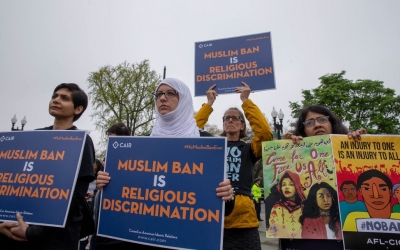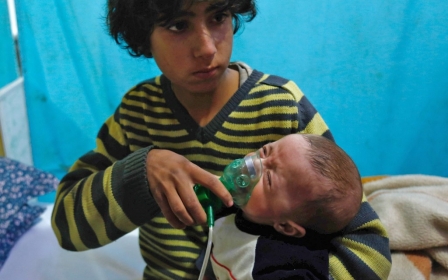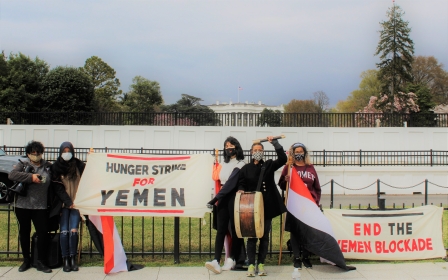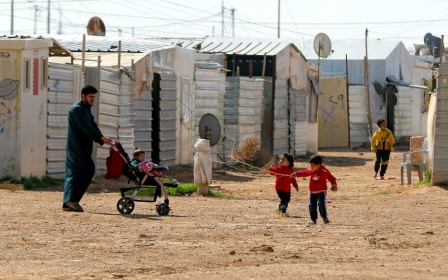Biden's refugee plan: White House pushes on with 'confusing' statements

A flood of condemnation rolled in immediately after the Biden administration announced last week that it was keeping the Trump-era cap on refugee resettlements to 15,000 for the fiscal year 2021.
Lawmakers from President Joe Biden's own Democratic Party, progressive activists and immigrant rights groups voiced outrage at the proclamation.
Progressive Congresswoman Pramila Jayapal called the decision "unconscionable"; Ilhan Omar, a former refugee herself, slammed it as "shameful"; Alexandria-Ocasio Cortez labelled the policy "completely and utterly unacceptable".
Dick Durbin, the Senate majority whip and one of the most senior legislators in the party, called on the administration to "reconsider this decision and stick to their promise of increasing refugee admissions".
Hours later, the White House released a statement saying Biden would "set a final, increased refugee cap" for the fiscal year in an apparent reversal of the earlier announcement.
The earlier declaration on Friday lifted Trump's refugee ban on several Muslim-majority, Arab and African nations, but confirmed the historically low cap of 15,000.
"The admission of up to 15,000 refugees remains justified by humanitarian concerns and is otherwise in the national interest," the memo said.
"Should 15,000 admissions under the revised allocations for FY 2021 be reached prior to the end of the fiscal year and the emergency refugee situation persists, a subsequent Presidential Determination may be issued to increase admissions, as appropriate."
Now the administration is saying that it did not reconsider its position under pressure from allies on Capitol Hill, chalking up the entire episode as a misunderstanding.
"We never said we're not raising the refugee cap. In the morning we said actually - with the information we put out, that once we reach 15,000, we will raise it," White House press secretary Jen Psaki said on Monday.
62,500 or 15,000
The US administration had committed in February to resettling 62,500 in this fiscal year, which ends on 30 September.
"A robust refugee admissions program is critical to US foreign policy interests and national security objectives," the State Department said in a report to Congress in February, which affirmed the administration's intention to resettle 62,500 refugees this fiscal year.
"Refugee protection is a concrete demonstration of the United States’ commitment to human rights, including freedom of religion and belief and freedom of expression, and is necessary to mobilize other countries to meet their humanitarian obligations."
Fast forward to last Friday, the US administration said it would resettle a fraction of that number - 15,000 - before reasserting that it will announce a higher cap on 15 May.
Facing questions about the seemingly inconsistent White House positions, Psaki insisted that there was no discrepancy between Friday's two statements.
'What is clear is that the determination... falls far short of what was proposed to Congress'
- Sunil Varghese, International Refugee Assistance Project
She said the 62,500-cap was an "aspirational, big goal" that will be difficult to meet because the agencies responsible for refugee resettlement have been "hollowed out" by the administration of former President Donald Trump.
"The challenge is not the cap; the challenge is the ability to process," Psaki said.
But she stressed that Biden wants America to be welcoming to refugees and remains committed to his objective for next year - 125,000 resettled refugees.
The White House also cited the influx of unaccompanied children seeking asylum at the US southern border as another problem delaying refugee resettlement.
The US administration started facing criticism over the issue earlier this month when advocates decried the slow pace at which refugees are being admitted since Biden took office in January.
Only 2,050 refugees had been resettled in the US in this fiscal year, according to a report by the International Rescue Committee (IRC).
"This delay means that highly restrictive and discriminatory Trump-era policies remain firmly in place," IRC said in a statement accompanying the report.
"As a result, tens of thousands of already-cleared refugees remain barred from resettlement and over 700 resettlement flights have been cancelled, leaving vulnerable refugees in uncertain limbo."
'Big miscalculation'
Sunil Varghese, policy director at International Refugee Assistance Project, said the messaging from the White House was "confusing".
"What is clear is that the determination that was signed on Friday falls far short of what was proposed to Congress… They haven't raised the number. They say that they're going to, and we'll believe it when we see it," Varghese told MEE.
He questioned why the White House would wait another month before revising the cap.
Varghese also dismissed the excuse that processing asylum seekers at the border is holding up refugee resettlement. While some agencies do work on both issues, they are two separate programmes.
"They're not related in a way where you can only do one or the other," he told MEE. "We can do refugee resettlement and care for children seeking asylum."
Varghese added that if the White House was reconsidering its initial plans on refugee resettlement for political reasons amid Republican outrage at the situation with asylum seekers at the border, it would be a "big miscalculation".
"If there was some calculation that the American public and politicians can't separate out refugees and unaccompanied children at the border, they were obviously mistaken because we saw the fury after they made their announcement on Friday," he said.
Trump had berated Biden throughout the presidential campaign over his refugee plans, often telling supporters at rallies that the Democratic Party would turn their state into a "refugee camp".
In contrast, the Biden campaign portrayed Trump as a xenophobic president citing his refugee and travel bans.
"Trump has reduced the refugee resettlement ceiling to its lowest levels in decades and slammed the door on thousands of individuals suffering persecution, many of whom face threats of violence or even death in their home countries," the Biden campaign said in its plan for Arab-American communities last year.
Middle East Eye propose une couverture et une analyse indépendantes et incomparables du Moyen-Orient, de l’Afrique du Nord et d’autres régions du monde. Pour en savoir plus sur la reprise de ce contenu et les frais qui s’appliquent, veuillez remplir ce formulaire [en anglais]. Pour en savoir plus sur MEE, cliquez ici [en anglais].


